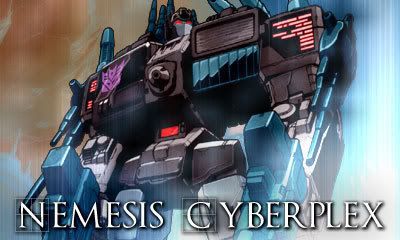Transformers and More @ The Seibertron Store
Details subject to change. See listing for latest price and availability.
N. Korea Agrees to Nuclear Disarmament
By Edward Cody
Washington Post Foreign Service
Tuesday, February 13, 2007; 1:50 PM
BEIJING, Feb. 13 -- In a landmark international accord, North Korea promised Tuesday to close down and seal its main nuclear reactor within 60 days in return for 50,000 tons of fuel oil as a first step in abandoning all nuclear weapons and research programs.
North Korea also reaffirmed a commitment to disable the reactor in an undefined next phase of denuclearization and to discuss with the United States and other nations its plutonium fuel reserves and other nuclear programs that "would be abandoned" as part of the process. In return for taking those further steps, the accord said, North Korea would receive additional "economic, energy and humanitarian assistance up to the equivalent of 1 million tons of heavy fuel oil."
The pledges -- in an agreement reached here by North and South Korea, China, Russia, Japan and the United States -- marked North Korea's first concrete commitment to carry out an agreement in principle, dating from September 2005, to relinquish its entire nuclear program. In the view of U.S. and allied diplomats, they also amounted to a down-payment on establishment of a nuclear-free Korean Peninsula and a new set of relations among the countries of Northeast Asia.
"The parties reaffirmed that they will take positive steps to increase mutual trust and will make joint efforts for lasting peace and stability in Northeast Asia," the accord said. "The directly related parties will negotiate a permanent peace regime on the Korean Peninsula at an appropriate separate forum."
In a statement issued by the White House, President Bush said he was pleased with the agreement. "These talks represent the best opportunity to use diplomacy to address North Korea's nuclear programs," he said. "They reflect the common commitment of the participants to a Korean Peninsula that is free of nuclear weapons."
Assistant Secretary of State Christopher R. Hill, the chief U.S. nuclear negotiator, qualified the first-step accord as "a very solid step forward."
"We're moving off the pages of the September '05 agreement onto the ground," he added. "We have an initial set of actions, and then we have a peek into the next phase, which would involve the dismantling of the facilities."
For its part, the United States reiterated an earlier promise to discuss normalizing relations with the Pyongyang government, a longstanding goal of North Korea. Without committing Washington to any decisions, the accord said the discussions would included removing North Korea from the list of state sponsors of terrorism and stopping application of the U.S. Trading with the Enemy Act to North Korea's business enterprises.
Separately, Hill said, the United States pledged to North Korea and to China, as chairman of the six-party process, that it will resolve within 30 days a dispute over U.S. charges that the Banco Delta Asia in Macau has been laundering illicit money from North Korea. This represented a concession from Washington, which previously had insisted the banking dispute was a matter of law-enforcement that should be treated separately from the nuclear diplomacy.
"This will promote peace and stability in Northeast Asia," said Wu Dawei, the Chinese chief delegate and host, as he announced the agreement after five difficult days of discussions.
In Washington, White House press secretary Tony Snow said that the oil and other concessions will be provided only if North Korea follows through on its promised actions, and noted the country is still under United Nations sanctions authorized after the country detonated a nuclear test device last fall.
"There is considerably more leverage on the North Koreans by virtue of the fact that you have the Chinese, the South Koreans, the Japanese and the Russians also involved here," Snow said. "They're answerable not merely to the United States, but in fact to their own neighbors who are significant stakeholders in this."
As part of the deal, the United States also agreed to help provide part of the fuel oil, along with China, South Korea and Russia, according to Hill. That meant President Bush will be obliged to seek Congressional approval, a possibly difficult exercise given the level of hostility toward North Korea among many U.S. lawmakers and within the administration itself.
Mindful of past disappointments, including the 1994 Agreed Framework that included similar provisions but was later voided by the Bush administration, Wu called on all six nations participating in the talks to scrupulously "carry out their commitments."
To make sure, North Korea also expressed willingness to accept the return of nuclear inspectors from the International Atomic Energy Agency to monitor what is going on at the reactor and other nuclear installations. But it said their work would be subject to agreement between the North Korean government and the U.N. nuclear agency, suggesting North Korea could exercise a veto power over their activities.
The accord, described as "initial actions," left for further negotiations the question of what to do with North Korea's declared nuclear weapons, estimated at a half-dozen bombs, and a stockpile of perhaps 50 kilograms of plutonium. In addition, it postponed discussions on a separate highly enriched uranium program that the Bush administration contends -- but North Korea denies -- was undertaken in secret as a second source of nuclear weapons fuel.
In a harbinger of the potential for difficulties ahead, the official North Korean news agency said the agreement required only a temporary suspension of the country's nuclear facilities.
"At the talks, the parties decided to offer economic and energy aid equivalent to 1 million tons of heavy fuel oil in connection with the DPRK's temporary suspension of the operation of its nuclear facilities," it said, referring to the country by the initials of its official name, the Democratic People's Republic of Korea.
Secretary of State Condoleezza Rice acknowledged a possibility of upcoming hurdles when talking to reporters about the agreement. "This is . . . still the first quarter; there is still a lot of time to go on the clock; but the six parties have now taken a promising step in the right direction," she said. She said that to "maintain momentum" the foreign ministers of the six countries would meet after 60 days.
The agreement also seemed likely to face opposition in Washington by conservatives who remain unconvinced that the North Korean leader, Kim Jong Il, ever intends to relinquish his nuclear weapons. Similarly, the Bush administration faced criticism from Democrats who charge the administration that broke away from the Agreed Framework in 2002 ended up five years later with a roughly similar accord.
In a sample of the criticism likely to come, former U.S. ambassador to the U.N. John Bolton said he was "disturbed" by the deal, which he said appeared to reward Kim for flouting earlier agreements.
In addition to the partisan debate, however, the lapse of time produced a significantly different and more dangerous landscape in which the talks are now taking place. North Korea exploded a nuclear test device last October and declared itself a nuclear power, giving it a status it did not have when the talks began in August 2003, or even when the agreement in principle was reached in September 2005.
These and other contentious questions will be negotiated in the months to come, beginning March 19, Wu said. The long-term discussions, diplomats acknowledged, are likely to be just as arduous as this week's talks, sooner or later bringing Kim face-to-face with the question of whether he is really ready to forsake the advantages and prestige that nuclear weapons confer on his isolated, impoverished country.
"How far they're willing to move, and at what pace, time will tell," Hill said. But he noted the million tons of fuel oil is approximately a year's supply for North Korea, suggesting that is the time frame envisaged for the difficult steps to be accomplished in the second phase. The oil is worth around $240 million at current prices.
To facilitate the further discussions, five working groups were established to bring together experts for detailed negotiations beginning in a month. They will cover nuclearization of the Korean Peninsula, normalization of U.S.-North Korean relations, energy and economic aid, a "Northeast Asia peace and security mechanism" and Japan's demand for an accounting of Japanese citizens kidnapped by North Korean intelligence agents, the accord specified.
Key Points of N. Korea Disarmament Deal
The Associated Press
Tuesday, February 13, 2007; 4:40 AM
The following are key points of an agreement reached Tuesday on steps for North Korea to end its nuclear weapons development:
* Within 60 days, the North must shut down and seal its main nuclear facilities at Yongbyon, north of the capital Pyongyang. International inspectors should be allowed to verify the process. For the initial steps, North Korea will get energy, food and other aid worth 50,000 tons of heavy fuel oil.
* The United States will begin bilateral talks with North Korea to normalize their relations and will begin the processes of removing North Korea from its designation as a terror-sponsoring state and also ending U.S. trade sanctions, but no deadline was set.
* Japan will begin bilateral talks with North Korea to normalize their relations.
* After 60 days, foreign ministers of all the countries will meet to confirm the implementation of the agreement and talk about security cooperation in northeast Asia. Some countries will hold a separate forum on negotiations for a permanent peace settlement to replace the 1953 cease-fire that ended the Korean War.
* The North must provide a complete list of its nuclear programs and disable all existing nuclear facilities. In return, the North will get aid in corresponding steps worth 950,000 tons of heavy fuel oil -- details of which will be addressed in later working group discussions.
* Five working groups will be created: denuclearization, U.S.-North Korea relations, Japan-North Korea relations, economic cooperation and on a peace and security mechanism in northeast Asia.
* The six-nation talks will meet again March 19.

Leonardo wrote:Take your lips off my pipe!
Ironhidensh wrote:I smell bullshit. N. Korea can't be trusted, not with the current government.

Ironhidensh wrote:I smell bullshit. N. Korea can't be trusted, not with the current government.

Ironhidensh wrote:N. Korea can't be trusted, not with the current government.
Kamen Rider Muppet-X wrote:Digest plz.

Wigglez wrote:Just remember. The sword is an extension of your arm. Use it as if you're going to karate chop someone with your really long sharp ass hand.
Shadowman wrote:Kamen Rider Muppet-X wrote:Digest plz.
North Korea, ruled Kim "Crazy Mofo" Jong-Il, just agreed to disarm their nuclear equipment (Mostly reactors, but there might be some WMDs lying around) in exchange for oil.
Did I mention Kim Jong-Il is crazy?
Anyway, this is too good to be true. Either it's legit, and we've just pushed nuclear war back a few years, or he's lying, and we're going to die.
Alpha Strike wrote:Shadowman wrote:Kamen Rider Muppet-X wrote:Digest plz.
North Korea, ruled Kim "Crazy Mofo" Jong-Il, just agreed to disarm their nuclear equipment (Mostly reactors, but there might be some WMDs lying around) in exchange for oil.
Did I mention Kim Jong-Il is crazy?
Anyway, this is too good to be true. Either it's legit, and we've just pushed nuclear war back a few years, or he's lying, and we're going to die.
and the world analysts are pushing for the second opinion.

DesalationReborn wrote:Alpha Strike wrote:Shadowman wrote:Kamen Rider Muppet-X wrote:Digest plz.
North Korea, ruled Kim "Crazy Mofo" Jong-Il, just agreed to disarm their nuclear equipment (Mostly reactors, but there might be some WMDs lying around) in exchange for oil.
Did I mention Kim Jong-Il is crazy?
Anyway, this is too good to be true. Either it's legit, and we've just pushed nuclear war back a few years, or he's lying, and we're going to die.
and the world analysts are pushing for the second opinion.
Not that it's conclusive he can actually hit anything important to the US (besides Alaska, but what's up there?), but...
Ha! I'm in the Midwest--he can't touch me!
DesalationReborn wrote:Not that it's conclusive he can actually hit anything important to the US (besides Alaska, but what's up there?), but...
Alpha Strike wrote:DesalationReborn wrote:Alpha Strike wrote:Shadowman wrote:Kamen Rider Muppet-X wrote:Digest plz.
North Korea, ruled Kim "Crazy Mofo" Jong-Il, just agreed to disarm their nuclear equipment (Mostly reactors, but there might be some WMDs lying around) in exchange for oil.
Did I mention Kim Jong-Il is crazy?
Anyway, this is too good to be true. Either it's legit, and we've just pushed nuclear war back a few years, or he's lying, and we're going to die.
and the world analysts are pushing for the second opinion.
Not that it's conclusive he can actually hit anything important to the US (besides Alaska, but what's up there?), but...
Ha! I'm in the Midwest--he can't touch me!
Judging by reports he can't hit the West Coast of the US unless he ships it UPS, and even then it has to pass through their incredible nuclear device sensing dog teams. The real concern isn't exactly the US itself, its Japan and China, and of course selling the tech to fundamentalist groups in Iran and Syria. If Little Kim decided to blow up Japan, the US would be soo totally screwed for its techological support. If China were hit, well imagine a really big African Honey Bee hive thats been poked with a big stick.

Alpha Strike wrote:well think of it this way, if Toyko got vaporized, imagine what would happen to all of our techological prowess? Thats right it would be vaporized. American's have lost the ability to do alot of the technological developments they used to do before the term OutSourcing became vogue. Nowadays American's can't build a toaster worth a damn let alone a high quality computer.
And I can pretty much surmise that if LA got Nuked, every republican in the world will cheer.

Caelus wrote:Fairly clever for George actually.
A PR coup for the Republicans, and a 'valid' excuse for gas prices to disproportionately increase.
Yeah, I'm being cynical. I mean, we're capitalists. We solve problems by throwing money at them. But this still doesn't set well with me... I'll look it over in more detail later tonight.
---
One side question though - how much profit do you reckon they made on this? That's a lot of oil, true, but nuclear development is expensive, and they're promising to just throw that investment away?
Klose25 wrote:North Korea, like Iran, is respected by some nations for its defiance over the United States. Why? Because it will never follow the United States' orders of disarming nuclear weapons. If the United States can possess nuclear weapons and regards itself as the world's only remaining superpower, why can't North Korea and Iran build their own nuclear weapons without U.S. interference?
Morph wrote:OLD NEWS!
AfterImage wrote:This's probably legit, unless KJI is way dumber than he looks. His nuclear test was an abject failure, bringing him rather more than a little bit of the wrong kind of attention on the world stage. The fuel oil was probably his original objective, unless he really is suicidal enough to want to try flinging nukes around that can barely clear a city block.
Bastard's just lucky anyone's listening at this point.
PS: It takes a Megaton range fusion weapon to actually wipe out a whole city, especially one the size of LA or Tokyo. Last I checked, the Korean nuke didn't even clear a full Kiloton.

Electron wrote:sledge your comments are like a fat chick raping a hot dog, its unpleasent to watch but in the end its gonna happen
Mr O wrote:I'm part Irish, part Scottish, very Welsh, mostly drunk, somewhat Transformers nerd and all bastard.
Registered users: Bing [Bot], Bumblevivisector, Glyph, Google [Bot], Google Adsense [Bot], Google Feedfetcher, MSN [Bot], Yahoo [Bot]
 [ Click to attempt signal recovery... ]
[ Click to attempt signal recovery... ]